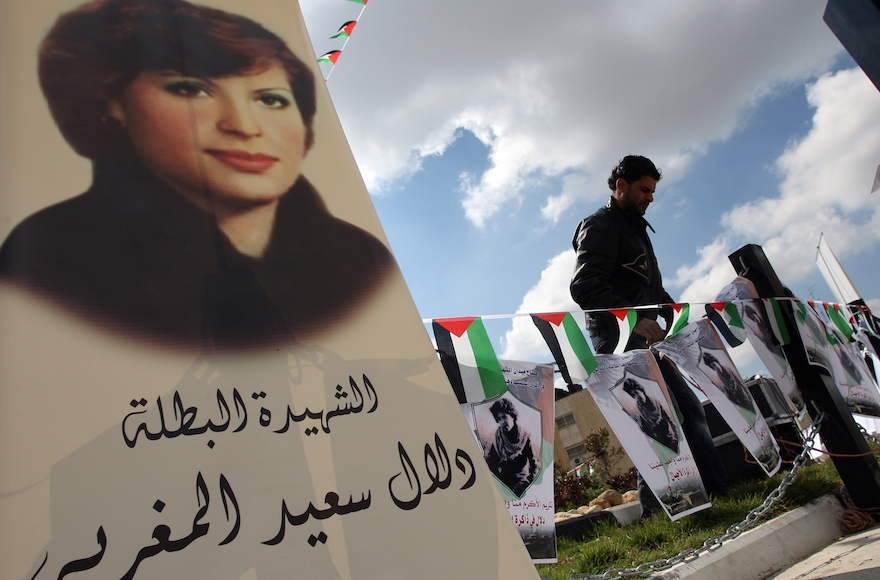Denmark will limit funding to Palestinian NGOs following investigation
Published December 24, 2017

Palestinians hanging posters with pictures of Dalal Mughrabi in Ramallah, March 13, 2011. (Abbas Momani/AFP/Getty Images)
(JTA) — Denmark will limit the number of Palestinian NGOs that it supports and increase oversight of the ones that it does fund following an investigation.
Danish Foreign Minister Anders Samuelsen announced on Friday that his ministry would halt funding to some 14 Palestinian organizations that have ties to terror groups. Starting in 2018, aid will be provided to 10 Palestinian NGOs instead of the current 24.
The Danish Foreign Ministry said in a statement that it will “continue to support civil society organizations focusing on the human rights situation in Palestine, which is a priority under the Danish foreign policy.” However, “the funds will be transferred under new and stricter conditions.”
Under the stricter conditions the NGOs cannot have ties to terror groups or use the money to promote the Boycott, Divestment, and Sanctions, or BDS movement against Israel.
The Danish investigation started in May came after the opening of a women’s center in the West Bank village of Buraq named for Dalal Mughrabi, who led the 1978 massacre on a highway near Tel Aviv that killed 37 civilians, many of them children, and injured dozens. The town refused to change the name saying it was chosen by the villagers “to commemorate a Palestinian hero who sacrificed herself for her country and therefore they have no intention to change its name regardless of the price.”
The center was built by the Palestinian Women’s Affairs Technical Committee, which received aid money from Denmark through the Ramallah-based Human Rights and International Humanitarian Law Secretariat, a donor program sponsored by Denmark, the Netherlands, Sweden and Switzerland.
The Danish investigation was opened at the urging of Prime Minister Benjamin Netanyahu and Strategic Affairs Minister Gilad Erdan.
Following Friday’s announcement, Erdan praised the Danish Foreign Ministry’s decision, calling it “a significant achievement for Israel in its resolute struggle against the boycott organizations, which suffered a severe blow today.”
He also said: “I’m glad Denmark has realized the Danish tax payer does not wish to fund – directly or indirectly – Palestinian organizations with ties to terrorism. I call on other nations on the European continent to take the same measure of moral responsibility and take similar steps.”
The Jerusalem-based watchdog organization NGO Monitor said in a statement that it has been following for more than ten years European government funding of the Human Rights and International Humanitarian Law Secretariat, and its previous incarnations.
“We identified grants to a number of NGOs linked to the PFLP (the Popular Front for the Liberation of Palestine), which is listed on the E.U.’s list of terror organizations, as well as others promoting incitement to violence, anti-Semitism, BDS, and anti-normalization. The evidence also revealed that managers of the Secretariat were similarly involved in anti-Israel political warfare,” the statement said.
Between 2006 and 2018, Denmark provided $12 million, of $45 million total budgeted in these mechanisms, NGO Monitor said. The Secretariat received $24 million from 2013-2018, of which Denmark donated $6.5 million.
“NGO Monitor applauds the Danish decision to stop funding this broken program. Taken together with Norway’s decision reversing participation in the Secretariat NGO funding mechanism, and with parliamentary scrutiny in Switzerland and the Netherlands (two additional donor countries), Denmark’s action highlights the belated awareness among Europeans of the need for due diligence and full transparency in NGO funding,” the group said.
Norway’s government withdrew its financial support for the center in June, saying it would not be associated with the glorification of terrorism. The United Nations also withdrew its funding at the same time and asked that its name be removed from the building.














